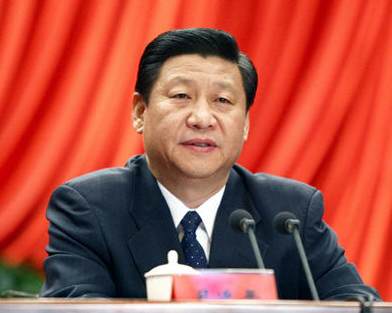China’s Communist Party leaders are matchless masters of formalized bluster and braggadocio. This is true for the basic reason that learning to live and work (and think) within the Party’s linguistic framework is an absolute necessity for any Chinese official. The Party’s political culture is conditioned by the language officials use — by its tifa (提法), or what we might call its “watchwords” or “New China Newspeak.”
In recent weeks, media have hyped Xi Jinping’s professed drive to reshape the Party’s rigid “working style”, or zuofeng (作风), and its exasperating “language style”, or wenfeng (文风), which puts slavish parroting of Party slogans above down-to-earth speech. And there is now fresh talk in China’s state media about making news coverage of official Party and government activities less rigid and more accessible.

[ABOVE: Is Xi Jinping the cool, casual new task-master of the Chinese Communist Party. Or will he recast the Party’s image in the same old mould?]
But what does this campaign — which of course has its own slogans — actually mean? Are Xi’s apparent efforts real, or is this another flavor-of-the-month Party mobilization, doomed to fizzle into the old, familiar formalism?
Is Xi really a “casual communist” out to shake and remake a rigid bureaucracy increasingly distant from the lives of ordinary people?
Real change is impossible to rule out. But it may be most helpful to refresh our memories about the Party’s history on this issue of language and style — which makes Xi Jinping’s Party makeover at least seem far less fresh.
This is not the first time Party leaders have talked, in the lofty tones to which they are so conditioned, about “reforming language style” (改文风). The talk goes back at least to the Yan’an Talks in 1942, where there were high-minded ideas about “opposing subjectivism to rectify the style of writing” (反对主观主义以整顿文风).
More than 30 years ago, in the wake of the Cultural Revolution, a new sense of alertness to the “fake, exaggerated and empty” nature of media during this decade of terror was the primary driver behind media reform. There was a new emphasis on shorter news stories grounded in facts. This sort of journalism, including critical news reporting and more serious discussion of social issues, was pioneered by papers like China Youth Daily, the official newspaper of the Communist Youth League, and by Shanghai’s World Economic Herald.
In the midst of Xi Jinping’s “new” approach to the walk and talk of Chinese politics, this old phrase, jia da kong (假大空), has popped up again.
An article in the Party’s official People’s Daily on Monday remarked changes in “working style” at the Central Economic Work Conference held over the weekend. There were no flowers on the dais, and fewer officials were seated there. Discussions, officials told the paper, were focused on practical questions. Bao Kexin (包克辛), chief executive of the China Grain Reserves Corporation, remarked:
Everyone already abhors things that are false, exaggerated and empty (假大空), so changing our style of work and our style of speaking is a popular sentiment.
In fact, the issue of changing the Party’s “language style” has returned to the official People’s Daily with stubborn persistence over the past three decades.
Back in 2001, the Sixth Plenary Session of the 15th CPC Central Committee issued a “Decision” — written, naturally, in the Party’s uniquely obscure political discourse — in which the issue of “strengthening and improving” the Party’s “working style” was addressed.
On November 23, 2001, the People’s Daily relayed the lessons propaganda leaders had drawn from the buzzword-laden “Decision”:
The Core Group of the Central Propaganda Department learned much from the “Decision,” and it deeply recognizes the importance and urgency of strengthening and improving the Party’s building of its working style. Everyone believes that working style is inextricably linked to language style, that working style determines language style and language style embodies working style. On the basis of serious research into the actual situation regarding propaganda work, they raised a number of specific measures for grasping working style, changing language style and avoiding and opposing formalism (形式主义) — these included opinions on the improvement of news reports on [Party] meetings and leaders events, an area in which breakthroughs have not been made over many years.
This article from more than 11 years ago acknowledges that the Party had tried, and failed (repeatedly), to change the way it works and talks.
That failure is not surprising when you understand CCP discourse as core to the way the Party works. Sloganeering is key to the mobilization approach that drives China’s vast bureaucracy. Leaders define priorities, which are then drummed through the bureaucracy, from the top all the way to the bottom, through slogans that encapsulate those priorities.
When Hu Jintao made pronouncements about “building soft power” in the 2007 political report, even local township leaders jumped on the soft power bandwagon. Now that Xi Jinping has pronounced his intention to make the Party look and feel more in touch, is it any surprise that everyone is jumping on his anti-bandwagon bandwagon?
In Chinese politics, everyone needs to be on the same page. And that’s difficult to accomplish when everyone is reading from a different phrase book. That’s important to remember for those who feel so sure Xi Jinping is throwing that book out the window.
But who knows? Perhaps if enough Party cadres heed Xi Jinping’s call . . .
As a reader’s letter to the People’s Daily said on July 25, 2001, when talk of a change of “style” was also the prevailing weather of the day: “Language style is a kind of ‘breeze,’ and changing our language style demands more than just blowing the breeze. It requires the real and long-term efforts of everyone.”






















